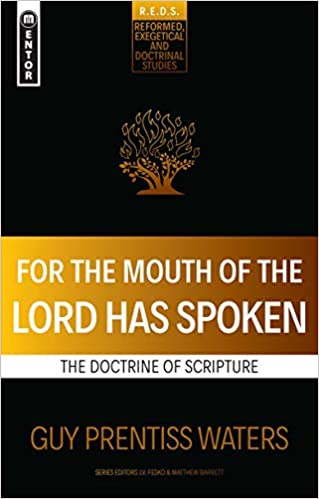A Book Review from Books At a Glance
by Ryan M. McGraw
God and Revelation are the two foundational principles of theology. Theology is ultimately about knowing the God who has revealed himself. Without God, there is nothing to know, and without revelation, there is no way of knowing him. Revealing himself clearly and stably, with inerrant and infallible authority, God declares Christ to us for salvation in the Bible. The incarnate Christ is the highest revelation of the Father, but we can know Christ only through what God tells us in Scripture, and by the Spirit enabling us to receive Christ through its teaching. This makes Scripture vital to the Christian faith. Guy Waters provides us with a profound, yet accessible, presentation of the classic Protestant doctrine of Scripture, which serves as a satisfying text on the topic that addresses contemporary challenges.
Water’s presentation of the doctrine of Scripture is orderly, logical, and up to date. Drawing from classic Reformed sources, especially from “old Princeton” authors like B. B. Warfield, Charles Hodge, and A. A. Hodge, he both revives classic Reformed teaching and gives readers a fresh case for it. His eight chapters address natural/general revelation, supernatural/special revelation, inerrancy and inspiration, the Spirit’s role in persuading us what Scripture is, the sufficiency of Scripture, the perspicuity of Scripture, and the problematic views of Karl Barth and Peter Enns. In addition to the issues lying on the surface of these topics, the author interacts extensively with modern Roman Catholicism and contemporary arguments for the continuation of revelatory gifts of the Spirit. He also includes vital topics, such as the identity and closing of the canon of Scripture, and frequent references to the Westminster Standards. In short, this work is well-balanced, promoting a comprehensive view of the main components of this vital Christian doctrine.
This book has many great strengths. First, Waters’ treatment of the doctrine of Scripture is standard and unremarkable Reformed theology. While this may seem like a strange thing to flag as a strength, it stands in contrast to many modern approaches to the doctrine of Scripture that do not take Scriptures’ statements about itself seriously. Waters presents clearly and persuasively a key and classic doctrine of the Christian faith.
Second, he interacts with modern issues, such as theistic evolution, Peter Enns on Scripture, and Karl Barth. Evolution presents various challenges to classic Christian theology, especially in relation to questions like whether there was a historical Adam and what it means for mankind to be God’s image. Enns has popularized aberrant views of Scripture, making inroads into evangelicalism and teaching that the Bible contains errors. And, love him or hate him, Barth continues to dominate modern systematic theology across virtually all doctrinal loci. His doctrine of Scripture upholds the need to meet God and know him through Scripture while denying that the Bible is objectively God’s word. Such issues make Waters’ treatment up to date, bringing the Reformed doctrine of Scripture into contact with contemporary issues that believers face.
Third, his work is biblical, historical, theological, and practical. This combination of virtues makes the book convincing, precise, and practical all at the same time.
One area deserving more attention is the relation of divine revelation to the Trinity (and not in the Barthian sense that the author explains and rightly rejects). Divine revelation is not simply about the Triune God, which he stresses well, but it comes by and through the Triune God. Christ the Savior is the focal point of revelation. However, the Trinity is the foundation of revelation, including especially the Bible. Such Trinitarian emphases were integral to early, medieval, and Protestant scholastic theology, but modern Protestant theology has largely bypassed them.
The Trinity is not merely an “add-on” to enhance our treatment of doctrine; the Trinity is center stage and the main show. God’s Triunity and Christ’s incarnation mark the climax of special revelation. A few Protestant authors have begun to recover such vital ideas, but only a few. Muted emphasis on the Trinity in relation to divine revelation often stems from otherwise outstanding nineteenth and twentieth-century authors, who reflect a post-Enlightenment eclipse of the place of the Trinity in every locus of Christian theology. This point should not detract from Waters’ outstanding work, but it highlights a void that still needs filling in modern Reformed thought.
Waters’ work on Scripture is an outstanding place to begin with the doctrine of Scripture. Those familiar with the doctrine will delight in his clear and exegetically grounded case, while those less so will find him easy to follow and keep up with. The author’s reputation for persuasiveness, clarity, and readability is well-deserved and shines forth abundantly in this volume. Read this book in order to bolster your understanding of what the Bible teaches about the Bible, and in your love for the God who reveals himself through its pages.
Ryan M. McGraw
Greenville Presbyterian Theological Seminary
